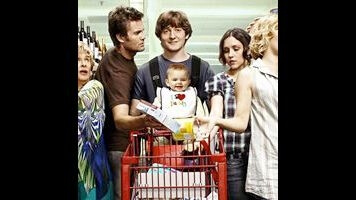Let’s start with the promise.
For all its quirk and irreverence, Raising Hope is, at its core, a show about a loving family. Like so many contemporary sitcoms, it marries a highly postmodern sensibility with an ooey-gooey heart. This show does the sweet stuff quite well, but rarely, if ever, gets cloying. In “Don’t Vote for This Episode,” we see Maw Maw during her lucid days, when she’d polish off The New York Times crossword every morning before breakfast. It’s Jimmy’s 18th birthday, and Maw Maw’s 80th, and she decides to lay down the law. Now that all the Chances are grown-ups, it’s time they fend for themselves. Her tough love works, and soon Burt and Virginia have drafted a family budget and a plan to repay her (at the glacial rate of $20 a week). The problem is Maw Maw’s mental state has begun to deteriorate, the rest of the Chance clan has to move back in to take care of her. The roles have officially been reversed, and we’ve got a perfect sitcom set-up: two young-at-heart parents and their grown son struggle to act like adults. Maw Maw is a source for a lot of Raising Hope’s bawdier laughs, so it’s nice to be reminded that Virginia and Burt actually care for her deeply. I am also a sucker for a good sitcom origin story—like Rachel waltzing in to Central Perk in a wedding gown—because it crystallizes everything we will come to know of the characters.
Raising Hope also has a flare for amusing sight gags and slightly cartoonish visual comedy that is great—in moderation. To wit: after Maw Maw kicks him out, Jimmy moves in to the tiny blue DVD return box at Howdy’s. I also loved Burt and Virginia brushing their teeth over the washing machine.
But, this reliance on visual comedy and sight gags can also get out of hand. For example, the whole Jimmy-as-Goth provides some easy laughs —I mean, who among us doesn’t find goths utterly high-larious?—but it’s comedy at the sake of character. The Goth thing is inconsistent with what we know of Jimmy. He’s a mild-mannered, passive guy who wears bland button-downs and geeky R. Crumb t-shirts. That doesn’t entirely preclude the possibility that he once went by “Drakkar Noir,” but the whole gag felt like it was picked up in a comedy remainder bin (the same place as Barney's fat suit). I understand the point—that Jimmy was going through an awkward and misanthropic phase—but couldn’t it have been more, well, Jimmy? The same might be said about Sabrina who, apparently likes guys who wear dog collars and blue lipstick even though she dates a meatheaded frat guy. Point being: sometimes this show sacrifices character coherence for a gimmicky laugh. (Though I confess, the part where Jimmy wakes up in the middle of the night and half his face has rubbed off on his pillow was an inspired touch).
Another problem, at least for this here recapper, is Raising Hope’s predilection for extreme gross-out comedy. For the record, I am not a priss. I actually have an abnormally high tolerance for scatological humor, but sometimes this show pushes me to my breaking point. Case in point: Clyde, the spitting Alpaca in Rosa’s basement. (See also: the episode where Jimmy shaves his father's testicles.) One globule of Clyde’s frothy spit would have sufficed, especially since we all knew this joke was coming from the very moment Rosa warned Burt about Clyde's spitting problem. But the spitting fight goes on for what seems like an eternity, and it’s almost enough to spoil the most sublime moment of the episode, in which we meet Rosa’s daughter. Shot from a low angle, and framed in a heavily accented deadpan, she explains to Burt and Virginia that she measures time in loads of laundry. It’s a scene that should be a touchstone for Greg Garcia and his team of writers, because it struck all the right notes—quirky, irreverent, possibly a tad offensive, but also strangely sweet.
Just the way Raising Hope should be.
Stray observations:
- “I have way more friends than Maw Maw these days, thanks to strokes, pneumonia, and a bus crash on the way to Atlantic City.”
- “Drakkar noir” means “black dragon ship." So now you know.
- “Girls with braces have absolutely no self-esteem.”
- They’re probably offensive to someone, but I always enjoy gypsy jokes. Or should I say, "Roma" jokes.
- “I kinda doubt the devil would still be a virgin at 18.”
- “Turns out my parents aren’t real cool with me dressing in white face.”
- “Did Jimmy take it?" "If he did he’s probably already spent it on a corset.”
- “Connect the dots.” “I’m not a puzzle guy.”
- “You do not want to be the guy in prison who wears the most makeup.”
- “It’s kinda noisy at night, but if you close your eyes it sounds like jazz.”
- File Shelley's supernatural shelf-stocking abilities under "Ways in which Raising Hope is excessively quirky."


 Keep scrolling for more great stories from A.V. Club.
Keep scrolling for more great stories from A.V. Club.